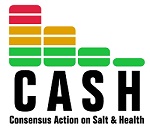Reducing Salt to Prevent a Stroke
High blood pressure is the single most important risk factor for stroke and salt is the major factor that raises blood pressure - salt is therefore responsible for many of these strokes.
Most of the UK population however are not aware of the link between salt and stroke and are currently eating too much salt.
Stroke is a leading cause of severe adult disability and the third biggest killer in the UK...
What is a stroke?
A stroke occurs when part of the blood supply to the brain is cut off, reducing the amount of oxygen that can get to the brain.
The effect of stroke can therefore be very sudden and serious.
There are two main types of stroke:
- a blockage in a blood vessel, called an ischemic stroke
- a bleed due to blood vessels bursting, called a haemorrhagic stroke
You are not alone if you have had a stroke.
Stroke is the third most common cause of death in the UK, with an estimated 150,000 strokes and mini strokes every year; about a third of which are fatal.
Many of these strokes could have been prevented with simple lifestyle changes such as by eating less salt.
Anyone can have a stroke; however there are a number of factors which can increase your risk.
- If you are male
- Over 55 years of age
- Have a family history of stroke
- Are of Asian or African descent
- Have high blood pressure
If you have a diet which is high in salt or fat, low in fruit and vegetables or if you smoke or are overweight, then your risk of having a stroke is higher.
Preventing a stroke
You can still reduce your risk of having a stroke or second stroke by making simple lifestyle changes, such as:

- Improve your diet, e.g. by eating less salt
- Lose weight
- Do more exercise
- Quit smoking
- Reduce your intake of high salt foods, particularly processed foods which contain a lot of hidden salt. Our average salt intake is 8.6g per day; much higher than the recommended maximum of 6g per day - about a teaspoon!
Eating more fruit and vegetables will increase your intake of potassium - this is helps to counteract the effect that salt has on increasing blood pressure.
www.actiononsalt.org.uk